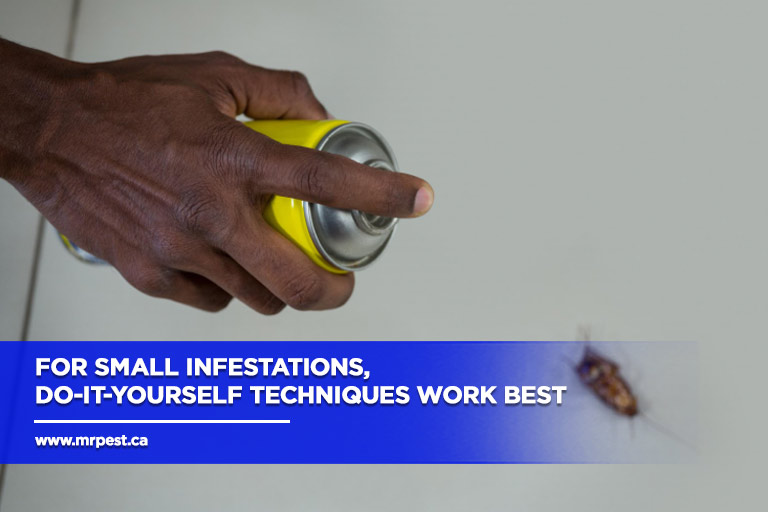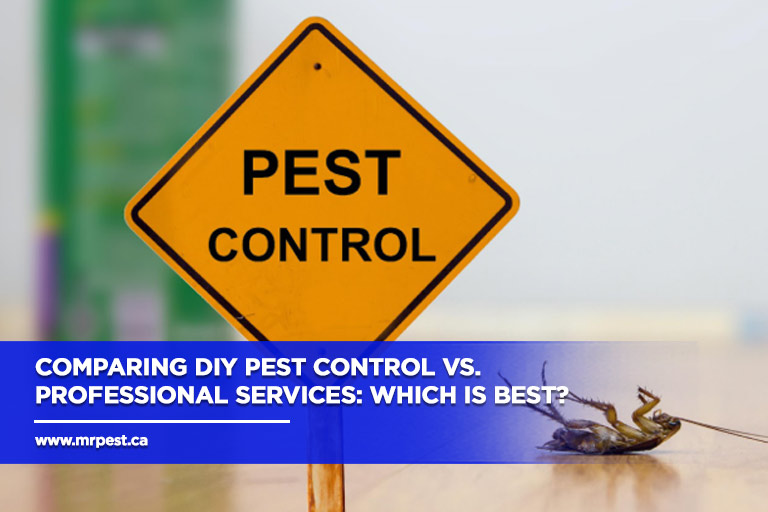Pest control is crucial not only for maintaining a clean and comfortable home but also for protecting health and well-being. According to a study, individually tailored integrated pest management (IPM) can be successful and cost-effective in an urban community, reducing the proportion of households with cockroaches from 80.5% to 39.0% (Brenner et al., 2003).
This just shows how effective strategic pest management can be in tackling persistent infestations. With options ranging from DIY remedies to professional pest control services, choosing the right solution is essential for achieving long-term, effective results.
So, which approach offers the best outcomes for homeowners? Let’s compare the advantages and limitations of each.
DIY Pest Control: What It Involves
Many homeowners consider DIY pest control as an attractive option, primarily due to the perceived cost savings and convenience it offers. Understanding what DIY pest control entails can help homeowners make informed decisions when faced with pest problems.
Cost Savings
One of the main reasons homeowners opt for DIY pest control is the potential for saving money. With readily available products at local stores or online, homeowners can attempt to tackle infestations without the need to hire professional services. The initial expense is often lower, making it a tempting choice for those looking to cut costs.
Common Methods
DIY pest control methods range from natural remedies to store-bought solutions. Common techniques include:
- Chemical Sprays: These are widely available for various pests, from ants to spiders. However, effectiveness can vary significantly based on the product and the infestation level.
- Traps: Sticky traps and bait stations can be effective for managing rodents and some crawling insects. However, they may not address the root cause of an infestation.
- Natural Remedies: Many homeowners turn to eco-friendly solutions, such as vinegar, diatomaceous earth, or essential oils, which can be less toxic to the environment and safer for pets and children. While these methods can provide temporary relief, they often lack the potency needed for severe infestations.
Accessibility and Convenience
DIY pest control products are typically easy to find, whether at hardware stores, garden centers, or online retailers. This accessibility allows homeowners to act quickly when they notice pest activity, which can be critical in preventing infestations from escalating. The convenience of following product instructions at their own pace adds to the appeal of DIY solutions.
Suitable Scenarios

While DIY methods can be effective in certain situations, they are best suited for minor infestations or preventative measures. Homeowners may find success in using DIY solutions for:
- Minor Pest Issues: Small ant trails or occasional flies can often be managed without professional help.
- Seasonal Pests: Homeowners can use DIY methods to prepare for seasonal invasions, such as spiders in the fall or wasps in the summer.
- Initial Control: Implementing DIY strategies can be a first step while awaiting professional intervention, especially when time is of the essence.
Limitations of DIY Pest Control
While DIY pest control methods may seem appealing for their low cost and convenience, there are several significant limitations that homeowners should consider. These factors can ultimately impact the effectiveness and safety of DIY approaches.
- Lack of Long-Term Results
One of the most notable drawbacks of DIY pest control is that it often provides only temporary relief. Many homeowners may find that, despite their best efforts, pests return shortly after treatment.
This is particularly true for more resilient pests like cockroaches and termites, which can thrive even after initial treatments. Without a comprehensive understanding of pest behaviour and life cycles, DIY efforts may fail to address the underlying issues, leading to recurring infestations.
- Potential Safety Risks
DIY pest control can pose safety risks, especially when using chemical products. Homeowners may not fully understand how to apply these chemicals safely, leading to improper use or over-application.
This can result in harmful exposure to family members, pets, and even the environment. Additionally, some commercial pest control products can be toxic if not handled correctly, increasing the risk of accidents and health issues.
- Difficulty Targeting Hidden Infestations
Many pests are adept at hiding, making it challenging for homeowners to identify and eliminate infestations effectively. For example, termites can remain concealed within walls for years, causing significant structural damage before detection.
DIY methods often lack the specialized tools and techniques needed to locate these hidden infestations, resulting in a missed opportunity for effective treatment.
- Knowledge Gaps
A lack of pest biology knowledge and experience can hinder the effectiveness of DIY pest control. Homeowners may not be familiar with the specific pest species they are dealing with, leading to misguided treatment choices.
For instance, using the wrong type of bait for a specific rodent can render efforts ineffective. Additionally, understanding the optimal timing for treatments is crucial; applying a pesticide at the wrong stage of a pest’s life cycle can diminish its efficacy.
- Resource Limitations
DIY pest control often relies on readily available products, which may not be as potent as those used by professionals. Many store-bought solutions are designed for home use, lacking the strength required to combat severe infestations effectively.
This limitation can lead homeowners to invest time and money into products that fail to deliver the desired results.
Professional Pest Control Services: Key Benefits

When faced with a pest problem, many homeowners opt for professional pest control services, recognizing the distinct advantages they offer over DIY methods. Here are some key benefits of engaging professional services for pest management:
- Expert Knowledge and Experience
Professional pest control technicians possess extensive training and expertise in identifying various pests, understanding their behaviour, and implementing effective treatment strategies.
This knowledge is crucial for diagnosing infestations accurately and determining the best course of action. Professionals are familiar with the latest techniques and products, ensuring that they use the most effective methods for each unique situation.
- Comprehensive Solutions
One of the most significant advantages of professional pest control services is their ability to provide comprehensive solutions tailored to specific pest problems. Unlike DIY methods that may address symptoms but overlook underlying issues, professionals conduct thorough inspections to identify the source of infestations.
They develop IPM plans that not only eliminate current pests but also prevent future outbreaks by addressing pest-conducive conditions around the home.
- Access to Advanced Tools and Treatments
Professional pest control services have access to specialized tools and products that are often not available to the general public. This includes industrial-grade pesticides, traps, and monitoring equipment that can target pests more effectively than typical store-bought solutions.
Additionally, professionals can implement methods that require training and safety protocols, ensuring the application of treatments minimizes risks to humans and pets.
- Time Efficiency
Managing a pest infestation can be time-consuming, especially for those unfamiliar with pest control techniques. Professional services can save homeowners valuable time by quickly assessing the situation and implementing effective treatments.
Rather than spending hours researching solutions and applying DIY methods, homeowners can rely on experts to handle the problem efficiently. For example, residents seeking pest control in Collingwood, professional services can be particularly beneficial in addressing local pest issues promptly.
- Ongoing Monitoring and Maintenance
Many professional pest control services offer ongoing monitoring and maintenance plans that ensure long-term pest management.
After an initial treatment, professionals can return periodically to inspect the property, monitor for any signs of new pest activity, and apply preventive measures as needed. This proactive approach helps maintain a pest-free environment and reduces the risk of future infestations.
- Safety Considerations
Engaging professional pest control services also enhances safety. Technicians are trained to handle pesticides and treatments safely, minimizing risks to homeowners, pets, and the environment.
Comparing Costs: DIY vs. Professional Services
When considering pest control, cost is often a significant factor. Although DIY pest control may seem more affordable at first glance, there are both short-term savings and long-term costs to consider. Here’s a look at how the financial implications of DIY and professional pest control differ:
- Initial Savings vs. Potential Long-Term Costs
DIY pest control often appeals to homeowners looking to save money, as store-bought solutions generally have a lower upfront cost than hiring a professional service. However, this cost-saving approach can lead to increased expenses over time if DIY methods prove ineffective or fail to eliminate the infestation entirely.
Repeated treatments are another hidden cost of DIY pest control. Many homeowners find they must continuously reapply products to maintain control over pests, adding up to a much larger expense over time than initially anticipated. In some cases, persistent infestations require purchasing new or more potent products, further increasing costs.
- Value of Investment in Professional Services
Investing in professional pest control services offers a level of assurance that DIY methods often lack. Professionals assess the property thoroughly, identify pest entry points, and use treatments that eliminate current pests and prevent future infestations.
This proactive approach can save money in the long run, as homeowners are less likely to face recurring issues that necessitate ongoing purchases of pest control products.
Professional pest control services can be particularly valuable for infestations that are difficult to treat, such as bed bugs, termites, and cockroaches. Specialists are equipped with industry-grade tools and products designed to eradicate these pests effectively, reducing the likelihood of costly reinfestations.
- Warranty and Follow-Up Treatments
This added assurance from pest control companies ensure that homeowners won’t incur extra costs if pests return shortly after treatment. In contrast, DIY pest control lacks any kind of guarantee, placing the financial burden on the homeowner if multiple treatments are necessary.
Follow-up treatments are particularly beneficial for long-term pest management, as they provide ongoing protection and allow professionals to monitor the property for any new pest activity. This service not only adds value but also gives homeowners peace of mind that their investment in pest control will be effective and lasting.
Find Lasting Solutions with Expert Pest Control
Choosing between DIY and professional pest control is a personal decision, but for homeowners seeking a comprehensive, safe, and long-term solution, professional services offer clear advantages.
If you’re looking for reliable pest control in Midland, trust the team at Mr. Pest Control to protect your home and family from unwanted pests. Call us today at (705) 739-7378 to schedule an inspection and experience the benefits of expert pest management.



